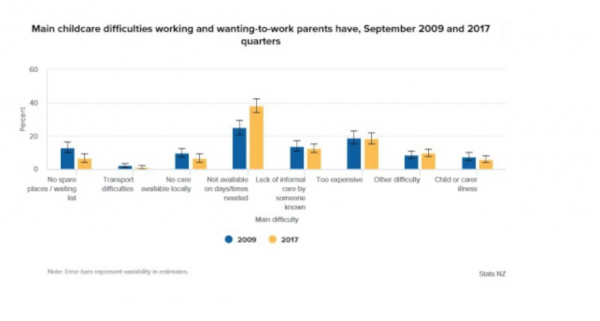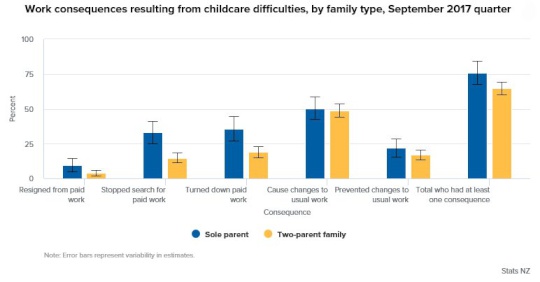
Not having care available when they needed it was the main childcare difficulty (38 percent) for parents who worked, or wanted to work, Stats NZ said today. Care being too expensive was their next main difficulty (19 percent).
“Many working parents use childcare arrangements to make their work possible. However, there’s a group who experience difficulties getting childcare when they’re at work or wanting to work. More flexible childcare arrangements may help parents take up work opportunities,” labour market and household statistics senior manager Jason Attewell said.
The Childcare in New Zealand Survey, a supplement to the Household Labour Force Survey in 2017, asked parents of children 13 years and younger about their children’s care arrangements, and their own work and study. Those who worked or had wanted to work in the last 12 months were asked about any difficulties getting childcare and any work-related consequences of those difficulties.
The 2017 survey found that 16 percent of all parents who worked or wanted to work had difficulties getting childcare. A lack of available care at the times needed was the main childcare difficulty for 38 percent of parents, up from 25 percent in 2009. Just 6.7 percent of parents reported ‘no spare places available’ as their main difficulty in 2017, down from 13 percent in 2009.

In 2017, nearly a quarter of mothers (23 percent) experienced difficulties getting childcare while working or wanting to work, compared with 9.3 percent of fathers.
Sole parents were more likely to have difficulties (27 percent) than those in two-parent families (14 percent) in 2017. For sole parents, 44 percent reported their main difficulty was care not being available at the times needed, up from 25 percent in 2009.
Childcare difficulties lead to work consequences
More than two-thirds (68 percent) of parents who experienced difficulties getting childcare in 2017 also experienced work-related consequences due to those difficulties. For this group:
• 49 percent made changes to their usual work
• 23 percent turned down paid work
• 20 percent stopped searching for paid work
• 18 percent were prevented from making changes to their usual work
• 5.3 percent resigned from paid work.
Note: Parents may report more than one type of work-related consequence.

As a result of their childcare difficulties, sole parents were more likely to turn down paid work, or to stop searching for paid work, than those in two-parent families. In 2017, 36 percent of sole parents turned down paid work and 33 percent stopped searching for paid work – compared with 19 percent and 15 percent of parents in two-parent families, respectively.
Due to childcare difficulties, mothers were more likely to turn down paid work (27 percent of mothers) and stop searching for paid work (22 percent) than fathers (14 percent and 12 percent, respectively).






Yes indeed the childcare model we have requires the child attend on fixed selected days but guess what our workforce is now heavily casualised. Workers don’t know what their hours are going to be week by week. How about rotating shifts? Yes at your job, but no not at the childcare centre.
Childcare operates “business hours” but guess what many people work evenings and weekends what about child care for them. Many people are rearing children alone they can’t arrange their shifts around a partner’s shifts in that case. What to do?
And what if the child get sick, which of course they are more likely to in an environment with lots of small children. It may come as a shock to the middle classes but sick and holiday pay for many is a luxury they don’t have.
And that great fall back grandma isn’t going to work either because if grandma is under 65 she’ll be whipped to work by WINZ. Many grandmas are doing work that would be much better for youth starting out in their working life. Many grandmas and grandads would rather be looking after their grandchildren than what they are being made to do.
Everyone would be better off if grandparents could do childcare instead of spending the final years of their working life in a job they don’t want to do while young people remain unemployed, working parents are living on stress and pre-schoolers are increasingly being corralled into centres with very large numbers of children in attendance for very long hours.
What a mess!
Comments are closed.